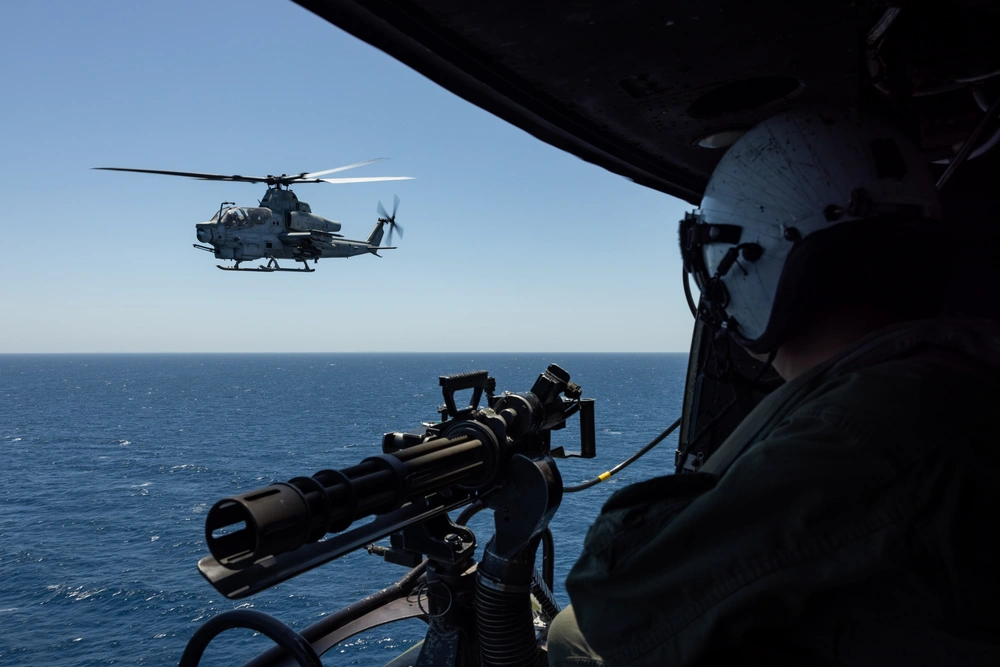As part of the U.S. military’s collaboration with the Indonesian National Armed Forces, also known as the TNI, the two nations demonstrated a joint strike exercise, including an air, sea and land operation during Super Garuda Shield 2024, taking place at Puslatpur 5 on the east end of Java Island, Aug. 31, 2024. Super Garuda Shield is an annual exercise hosted by Indonesia in partnership with multinational forces. It is an excellent opportunity to strengthen international relationships and to build shared land, sea and air partnerships. The joint strike exercise is a multinational strategic concept developed as part of Super Garuda Shield. The joint strike exercise involved support from land rockets, naval fire, and aircraft defense, used to support coastal operations and improve strategic collaboration as partners. Indonesian officials were proud to display this developed concept to top ranking TNI and U.S. officers, including U.S. Admiral Samuel Paparo, commander of the U.S. Pacific Fleet, TNI Gen. Agus Subiyanto, commander of the TNI, who joined to observe the exercise in action.

The joint strike exercise started with a U.S. reconnaissance from an unmanned aviation vehicle, also known as a UAV, to initially identify the target, while a TNI ScanEagle drone and an air reconnaissance asset, a Boeing 737, worked bilaterally for air patrol. After receiving the firing order from the UAV, the TNI fire direction officer carried out the calculation of the target data to be converted into shooting data, who then sent commands to the all-elements commander to conduct a firing sequence. The missile demonstration included three different systems: a High Mobility Artillery Rocket System (HIMARS), complemented by an Artillery Saturation Rocket System (ASTROS) and a Vehicle-Agnostic Modular Palletized intelligence, surveillance and reconnaissance rocket equipment (VAMPIRE). This multi-purpose piece of military equipment allows soldiers to see the effect they have on a target after the initial strike. This is important to make knowledgeable decisions on where and when to focus artillery during training exercises. Multiple rockets were launched from these systems at a small target located several kilometers away.

“We are witnessing two very inspiring things: first it is an example of precision, teamwork and professionalism. What I think is even more meaningful is that what we are seeing is the future. The future of warfighting is increasingly ‘joint’. Land, air, sea, cyber, information, all at once. We aren’t doing this to project power, we are doing this to demonstrate will. A demonstration of will so that we don’t have to fight. Every aspect of this year’s iteration of Super Garuda Shield should challenge us to collectively work together and achieve our training objectives. I have to tell you how much I admire the work each and every one of you have done,” Paparo said during his closing remarks. “Look left, look right, look at the man or woman next to you and see how alike we are, how much we can learn from each other, how we can partner with each other, and how we can imagine our future.”,” Paparo said about the joint strike exercise.

Two U.S. Marine Corps helicopters, a UH-1Y Venom and AH-1Z Viper, were sent into the skies shortly after firing was completed to conduct a battle damage assessment of the target area. After the assessment of the exercise, the helicopters stayed in the skies to launch another attack on the target area. To conclude the event, two TNI F-16 Fighting Falcons, carrying four MK 82 bombs on each plane, released the projectiles on the target area once again, demolishing the intended target and inciting celebration from the watching audience, filled with U.S. service members and members of the TNI, with other countries there to observe the event. During the opening ceremony for Super Garuda Shield 2024, U.S. Air Force Maj. Gen. Joseph Harris II, commander of the Hawaii Air National Guard, shared his aspirations for the joint strike exercise and the bilateral training throughout Super Garuda Shield as a whole. The joint strike exercise is just one of many examples of multinational collaboration and teamwork while achieving shared training objectives.
















